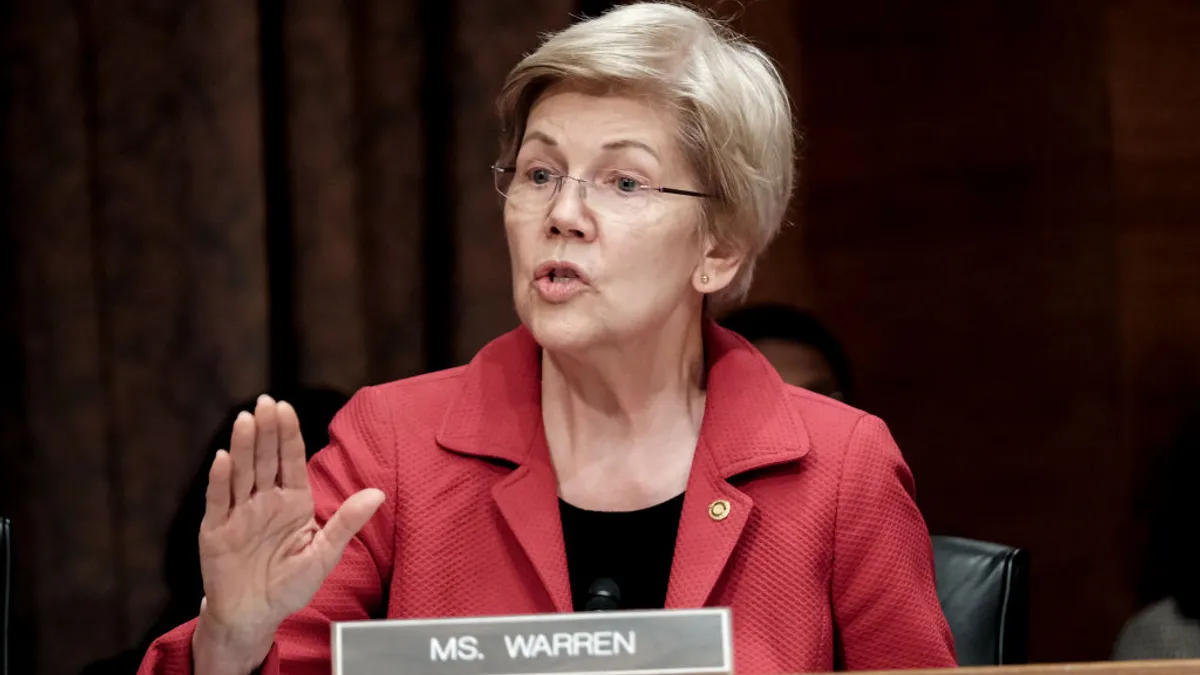Dive Brief:
- Sen. Elizabeth Warren, D-MA, is taking the Justice Department to task over its recent settlement with TD, saying it didn’t go far enough to discipline the bank’s “reckless leadership” and allowed the lender “to side-step the penalties that Congress intended to apply to money laundering crimes.”
- In a Wednesday letter to Attorney General Merrick Garland and Deputy Attorney General Lisa Monaco, Warren noted the DOJ didn’t charge high-level executives at the Canadian bank and “creatively structured the charges to shift legal liability from TD Bank to its holding company.”
- Warren demanded explanations on the DOJ’s decisions and whether the settlement precludes charges for executives, and asked for details on the compensation clawbacks regulators are requiring as part of the plea agreement. DOJ spokespeople didn’t immediately respond to a request for comment.
Dive Insight:
Warren said prosecutors didn’t go far enough to discipline TD, given the “egregious” nature of its crimes and that executives allowed the bank to serve as “a criminal slush fund.”
The senator asserted that the “carefully crafted” plea agreement, shifting liability from the bank to the bank holding company, enables TD to avoid facing the spectrum of penalties lawmakers have put in place for banks involved in criminal money laundering, Warren contended. That includes the OCC’s “death penalty” provision for banks.
She took issue with the DOJ having the bank plead guilty to conspiracy to launder money, when a guilty plea to a money laundering charge would have set in motion the process by which the OCC seeks to revoke a bank’s charter.
The OCC can also initiate that process if a bank is convicted of failing to maintain an adequate AML program or failing to file accurate currency transparency reports, noted Warren, a lawyer and former law professor.
“DOJ did identify these crimes in the settlement but allowed TD Bank’s holding company — not TD Bank itself — to plead guilty to ‘causing’ TD Bank to ‘fail to maintain an AML program that complies with the Bank Secrecy Act’ and ‘causing’ TD Bank to ‘fail to file accurate CTRs,’ among other charges,” she wrote.
Yet all violations of U.S. AML laws occurred within the national bank, she noted. And bank holding companies are not subject to the OCC’s death penalty provision.
Those decisions “represent absurd legal gymnastics by DOJ” that enabled TD and its top executives to skirt full responsibility, Warren wrote. “This is not an acceptable outcome.”
Warren posed a handful of questions to “better understand” the DOJ’s approach to the settlement, including probing the choices behind the specific charges, and asking whether prosecutors consulted with the OCC or other banking regulators as they negotiated the agreement with TD. Warren requested answers by Nov. 15.
TD entered a plea agreement with the DOJ and was ordered to pay $3.09 billion in penalties to various agencies stemming from investigations into the Toronto-based bank’s money laundering safeguards. The Office of the Comptroller of the Currency also capped assets for TD’s U.S. retail operations at $434 billion.
Criminals used the bank to move money connected to the illicit drug fentanyl, the DOJ found. As TD failed to adequately monitor trillions of dollars in transactions for several years, three money-laundering networks were able to move hundreds of millions of dollars through the bank’s accounts.
Bank employees, too, became aware of TD’s expanding target by criminals. One branch employee, observing an instance of criminal activity in 2021, asked: “How is that not money laundering?” Another employee responded, “oh it 100% is.”
TD is required to create a new U.S. office focused on fixing its AML shortcomings, ensure it has sufficient resources to address the deficiencies, and will be independently monitored and reviewed on its compliance, the DOJ said.
A TD spokesperson declined to comment Thursday on Warren’s letter.
When the settlement was announced Oct. 10, Garland said the DOJ’s criminal investigations into individual employees “at every level” of the bank were “active and ongoing.”
Though the DOJ “has long failed to hold corporate executives accountable for crimes that occur on their watch,” Warren said, she addressed Garland pointedly, saying: “you have vowed to change that approach.”












